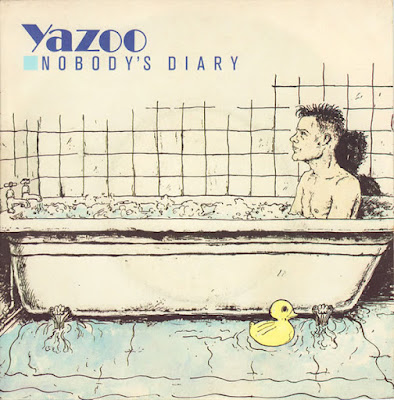
Three weeks at number from w/e 18th June 1983
There were some very dull reasons underlying this quarter-hearted deception. In 1983, Elvis Costello’s record label F-Beat were undergoing a change in their worldwide distribution arrangements, moving from Warner Brothers to RCA. The protracted legal discussions had delayed the release of his next album “Punch The Clock”, and rather than also delay the release of the first single “Pills and Soap” longer than necessary, Costello opted to release it under a pseudonym on F-Beat’s “indie” subsidiary Imp Records.
There are two possible reasons why he took this path – firstly, there’s a strong chance that he may have been impatient while bureaucratic issues were being discussed in the background, feeing that if he didn’t get something fresh out soon, momentum may be lost. There was also the small matter of the imminent General Election in the UK, which caused the subjects touched upon during this single to potentially feel more relevant, pressing and explosive.
“Pills and Soap” could, to a half-listening person, be referring to animal cruelty with the references to Noah’s ark and melting animals “down for pills and soap”. This was the explanation Costello gave to the BBC when they nervously asked him what the song was about. Closer inspection reveals this to be nonsense, though. Firstly, the chorus refers to “children and animals, two by two”, then points its finger towards the aristocracy and perhaps even the royal family: “The king is in the counting house, some folk have all the luck/ And all we get is pictures of Lord and Lady Muck/ They come from lovely people with a hardline in hypocrisy/ There are ashtrays of emotion for the fag ends of the aristocracy”. There are other sharp, bitter tasting lines on offer besides, such as “You think your country needs you but you know it never will”, which totally give the game away.
If “Shipbuilding” was a sympathetic gaze at a community (and country) in crisis, “Pills and Soap” is unfocused invective – an unfixed list of the malaise that Costello feels the UK fell under in the early eighties; decadence, distraction, blind patriotism, the establishment worshipping view of the tabloid press. The animals and children being melted down are the expendable lower classes; though of course, the fact Costello is a vegetarian isn’t a complete coincidence here.
Musically speaking, it’s absurdly simple, with a drum machine generating simple, clicking beatnik Daddio rhythms which combine with Steve Naive’s thundering, Hammer Horror piano lines. It’s an extraordinarily daring first single to lift from an album, offering the polar opposite of so much eighties pop – while that was often elaborate and multi-faceted, “Pills And Soap” is threadbare and puts the emphasis and weight of the record’s worth on its lyrics.
How you feel about it really depends upon how receptive you are to such earnest singer-songwriter minimalism, and also crucially when you first heard this. In 1983, there’s little doubt that Costello’s observations were controversial and insightful. Britain was under the early spell of Thatcherism and the behaviour of the press and the Government in power was quite radical – earlier Conservative governments obviously held aspirations to defeat Trade Unions, but few had swung the axe with as much enthusiasm and as little regard for communities as Auntie Maggie.



